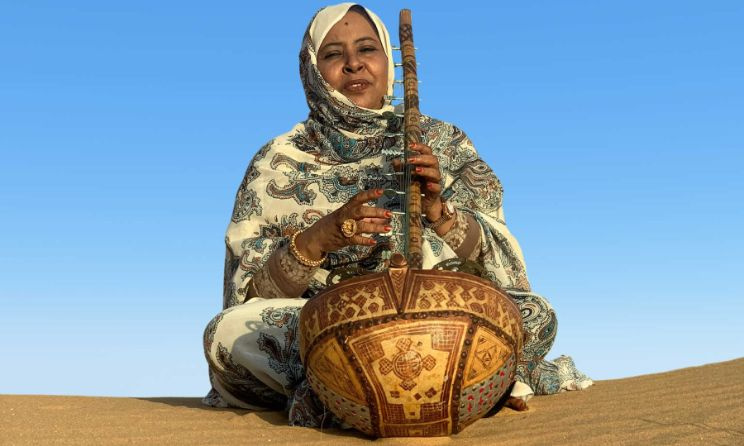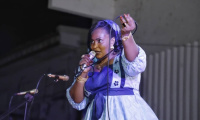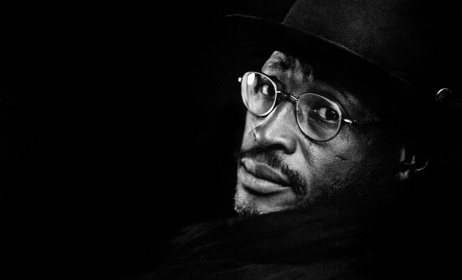Three African artists named 2022 Aga Khan Music Awards laureates
Tanzanian composer and singer Yahya Hussein Abdalla, Malian singer and guitarist Afel Bocoum, as well as Mauritanian singer and harp player Coumabne Mint Ely Warakane have been named as laureates of the 2022 Aga Khan Music Awards. The three are among seven other recipients of the awards selected from around the world.
 Mauritanian singer and harp player Coumabne Mint Ely Warakane. Photo: AKDN
Mauritanian singer and harp player Coumabne Mint Ely Warakane. Photo: AKDN
The triennial awards, established by His Highness the Aga Khan in 2018, recognise exceptional creativity, promise and enterprise in music in societies across the world in which Muslims have a significant presence.
The award recipients will share a prize fund of $500 000 and get opportunities to expand the impact of their work and develop their careers. These include commissions for new works, recording contracts and support for pilot education initiatives with the goal of providing recognition for today’s generation of artists and inspiring and helping a new generation of performers and composers in the East and West.
Laureates of the Aga Khan Music Awards will be celebrated at a ceremony and series of affiliated events in Muscat, Sultanate of Oman, organised in conjunction with the Aga Khan Award for Architecture from 29 to 31 October 2022.
“No other award or prize focuses on the constellation of devotional music and poetry, indigenous classical music, traditional folk music, and tradition-inspired contemporary music that has flourished in cultures shaped by Islam,” the organisers said.
Laureates were recognised for engaging with contemporary social and environmental issues while sustaining and developing musical traditions. They serve to fill a unique cultural need by recognising and developing exceptional creativity and promise in music and music education in societies across the world.
In naming the laureates, the awards' master jury expressed its desire to support as many outstanding nominees as possible from the geographically and culturally diverse pool of close to 400 nominations in a time of urgent need for musicians and music educators. While contributing to the preservation and ongoing development of musical heritage, many of the laureates draw on the power of music to raise awareness about social and environmental issues.
The laureates of the 2022 Aga Khan Music Awards are:
Zakir Hussain (India)
Hussain was awarded the special prize for Lifetime Achievement in recognition of his highly visible model of enlightened cross-cultural musicianship that has elevated the status of the tabla both in India and around the world through countless artistic collaborations, concert tours, commissions, recordings and film scores.
Afel Bocoum (Mali)
Bocoum is a singer and guitar player from Niafunké, Mali whose music combines acoustic guitar with local instruments to echo the sound of “desert blues” in an earthier, tradition-based style.
Asin Khan Langa (India)
Langa is a sarangi player, singer, composer and community activist from Rajasthan’s hereditary Langa musical community, who performs Sufi poetry set to traditional and newly composed melodies.
Coumbane Mint Ely Warakan (Mauritania)
Ely Warakane belongs to a hereditary caste of musician-poet-singers (griots) in Mauritania called iggāwen in the local Hassāni Arabic. Her own family represents the iggāwen tradition of Trarza, in Mauritania’s southwest, where she learned from her aunt, the singer Wana mint Bouban (1933-2022), to sing and play the ardin, an angular harp with a calabash resonator that is always played by women.
Daud Khan Sadozai (Afghanistan)
Sadozai is a leading exponent of the Afghan rubab who has had a major impact on the preservation, development and dissemination of Afghan music worldwide.
Peni Candra Rini (Indonesia)
Rini is an Indonesian composer, improviser, vocalist and educator whose knowledge of traditional Indonesian performing arts informs her creation of new works produced worldwide.
Soumik Datta (UK)
Datta is a sarod player who fuses his training in Hindustani classical music with pop, rock, electronica and film soundtracks to raise awareness about urgent social issues including climate change, refugees and mental health.
Yasamin Shahhosseini (Iran)
Shahhosseini is a leading young master of the oud who is reimagining the place of this instrument in Iranian music through her innovative compositions and improvisations.
Zarsanga (Pakistan)
Zarsanga is a singer from Khyber Pakhtunkhwa, Pakistan, known as the Queen of Pashtun Folklore for her career-long devotion to the orally transmitted traditional music of tribal Pashtuns.
Special mentions:
Dilshad Khan (India)
Khan is a 10th-generation sarangi player from a hereditary lineage in Rajasthan who is expanding the language of the sarangi in film music and through innovative cross-cultural collaborative projects.
Golshan Ensemble (Iran)
Four women who perform Iranian traditional music with a contemporary sound and are active as teachers, with a special focus on transmitting their musical tradition to girls and women.
Sain Zahoor (Pakistan)
Punjabi musician with a lifelong practice of singing Sufi poetry in local shrines and festivals, often accompanied by ecstatic dance.
Seyyed Mohammad Musavi and Mahoor Institute (Iran)
Founder and long-time director of Mahoor Institute of Culture and Arts, who has made seminal contributions to the development of Iranian music and musicology.
Zulkifli and Bur’am (Aceh, Indonesia)
Revitalisers of Acehnese song traditions who have cultivated community building amongst youth through their participation in Bur’am, a traditional singing and drumming ensemble established by Zulkifli.
The Aga Khan Music Awards Master Jury also named Musallam al-Kathiry as the winner of a special award for Excellence in Service to Omani Musical Heritage. Mr al-Kathiry, a music researcher, arts manager, performer and composer from Muscat, Sultanate of Oman, has made important contributions to the collection, documentation, preservation and dissemination of Omani music.
The Master Jury that selected the winners consisted of six distinguished arts professionals from Azerbaijan, Bahrain, India, Turkey, Tunisia and the United State.
The full biographies of the laureates are available here.





















Commentaires
s'identifier or register to post comments